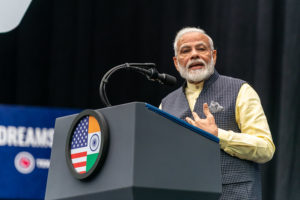
Prime Minister Narendra Modi of India addresses his remarks on stage Sunday, Sept. 22, 2019, at a rally in honor of Prime Minister Modi at NRG Stadium in Houston, Texas. (Official White House Photo by Shealah Craighead)
In Foreign Policy, Salil Tripathi suggests India needs a “makeover,” in the face of declining freedom in the country. Tripathi writes:
Continuing to describe India as “the world’s largest democracy” is increasingly bizarre. Today, India is merely the most populous country to hold elections. It has the form of democracy but has lost the content. Since Modi came to power, India’s ranking in the United Nations Development Program’s human development indicators has stagnated. In its annual review of political freedoms around the world, Freedom House no longer categorizes India as “free.” India is the only nominal democracy among the 10 worst jailers of writers and journalists, according to PEN America; according to Reporters Without Borders, India has become one of the most dangerous places in the world for journalists to work.
Modi operates like a master performer with a keen eye for exceptional photo-ops. Never mind that many of his policies are whimsical—like the sudden demonetization of the currency in 2016—or woefully inadequate, such as India’s response to the pandemic or to the country’s widening inequality. There are 200 million Indian Muslims—and currently not a single one in Modi’s cabinet.
Of course, India remains a hugely important country. During one of my conversations with Lee when I was a reporter in Singapore, he told me his biggest worry was turmoil in China. But have we thought about what might happen if instead of China, it’s India that disintegrates? If poorly educated, Hindi-speaking northern India increasingly imposes its retrograde values on a more educated, prosperous south, there will be trouble ahead. Going back to a social order before British rule (if it ever existed at all)—requiring moral codes that restrict women, enforcing religious practices, legislating bizarre vegetarian dietary practices, and requiring everyone to speak a single language, believe in one faith, and support one ideology—then Indian unity, preserved for the past 75 years, could begin to unravel. As any glance at a history book makes clear, that is unlikely to be a pleasant process.
An outwardly democratic India may seem like a good counternarrative to an autocratic China. But India has been an unreliable ally of the West and is looking increasingly odious. Look no further than India’s votes at the United Nations abstaining from condemning Russia’s unlawful and brutal invasion of Ukraine.
To regain the moral ascendancy India had at independence, the country needs a makeover. India needs to return to its origins—the “idea of India” and the spirit that its sole Nobel laureate in literature, Rabindranath Tagore, celebrated in his poetry. Even democratically constituted nations can be gripped by madness, as Europe’s bloody 20th century shows. India is a great adventure and fantastic experiment, but its current leadership is turning it into a mere shadow of what Gandhi, Nehru, and Tagore imagined. That failure of imagination is the ultimate tragedy as India now turns 75.
If you’re willing to fight for Main Street America, click here to sign up for the Richardcyoung.com free weekly email.




